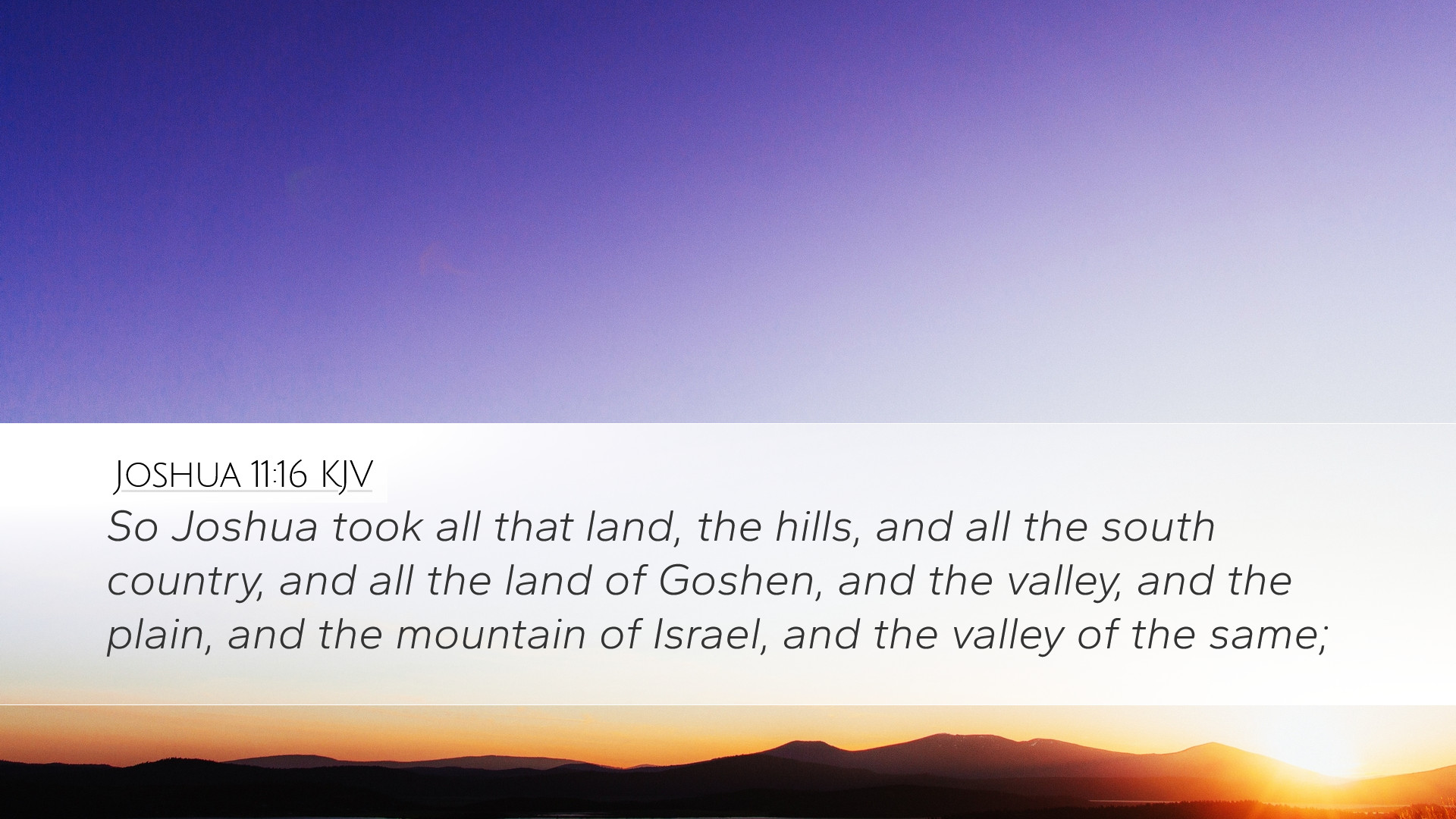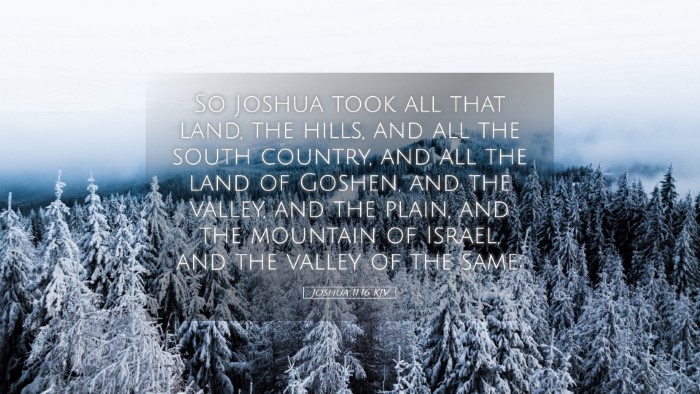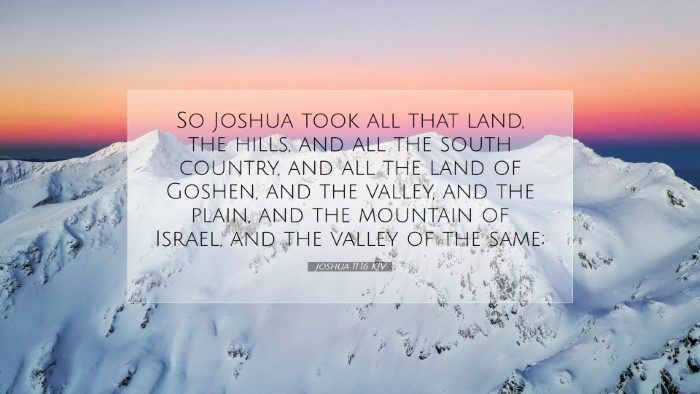Old Testament
Genesis Exodus Leviticus Numbers Deuteronomy Joshua Judges Ruth 1 Samuel 2 Samuel 1 Kings 2 Kings 1 Chronicles 2 Chronicles Ezra Nehemiah Esther Job Psalms Proverbs Ecclesiastes Song of Solomon Isaiah Jeremiah Lamentations Ezekiel Daniel Hosea Joel Amos Obadiah Jonah Micah Nahum Habakkuk Zephaniah Haggai Zechariah MalachiJoshua 11:16
Joshua 11:16 KJV
So Joshua took all that land, the hills, and all the south country, and all the land of Goshen, and the valley, and the plain, and the mountain of Israel, and the valley of the same;
Joshua 11:16 Bible Commentary
Commentary on Joshua 11:16
Verse: "So Joshua took all that land, the hills and all the South Country, and all the land of Goshen, and the lowland, and the Jordan plain, the mountains of Israel and its lowlands."
Introduction
The passage of Joshua 11:16 marks a significant moment in the narrative of Israel's conquests under Joshua’s leadership. This verse not only outlines the geographical scope of the conquests but also signifies the fulfillment of God’s promises to His people. The detailed mention of the different regions highlights both the strategic military achievements of the Israelites and the theological importance of land as a divine inheritance.
The Scope of Conquest
This verse elaborates on the various regions that Joshua successfully captured. Each geographical reference denotes both a physical reality and the spiritual implications of Israel's possession of the Promised Land.
- The Hills: These elevated regions may symbolize spiritual heights as well as the challenges faced by the Israelites. The hills often represent places of worship and nearness to God.
- The South Country: This area, often referred to as the Negev, is essential for understanding the diversity of the land. It demonstrates God's providence in providing suitable habitat and bounty for His people.
- The Land of Goshen: Reminding us of the Israelites' early history in Egypt, Goshen's inclusion emphasizes God's faithfulness to His covenantal promises from slavery to prosperity.
- The Lowland: Also known as the Shephelah, this signifies fertile land that supports agricultural life, underscoring God's provision for His people.
- The Jordan Plain: The proximity to the Jordan River carries both practical and spiritual significance, as it serves as a border and medium through which God’s miracles (like the crossing of the Jordan) were manifest.
- The Mountains of Israel: This alludes not only to the physical challenge of the mountainous terrain but also symbolizes the spiritual ascent that Israel must achieve in its relationship with God.
- The Lowlands: These areas provide sustenance and vital resources necessary for the Israelites' survival, showcasing God’s omnipotent ability to provide.
Theological Significance
From a theological perspective, the land is a recurring theme in Scripture that represents more than just territory; it symbolizes God's faithfulness and the fulfillment of His promises to Abraham, Isaac, and Jacob. The collective summary of Joshua’s conquests in this verse enhances the understanding of God’s redemptive plan through the nation of Israel.
- Divine Promise Fulfillment: The passage reflects the culmination of God's promises made to the patriarchs regarding the land flowing with milk and honey, a land of abundance and rest.
- National Identity: Possession of the land solidifies Israel's identity as a nation chosen by God, reinforcing the notion that their victories result from divine assistance.
- The Role of Obedience: Joshua’s leadership exemplifies the importance of obedience to God’s commands, facilitating their victory and establishing a model for subsequent leaders.
Insights from Public Domain Commentaries
Matthew Henry's Commentary
Matthew Henry emphasizes the comprehensive nature of Joshua's conquests, noting that "there was not a city left that did not fall". He reflects on the strategic approach Joshua took and highlights God's hand in the outcome, encouraging readers to see this as a testament to divine sovereignty in fulfilling promises. Henry advocates for the importance of securing and enjoying God's blessings in our lives while remaining vigilant against complacency.
Albert Barnes' Notes on the Bible
Albert Barnes draws attention to the meticulous detail of the land described, which he argues serves to underscore the remarkable victory achieved by Joshua. He notes that this narrative fulfills earlier prophetic statements made regarding the allocation of land to the tribes of Israel. Barnes stresses the juxtaposition of the Israelites' military prowess and God's assistance, reminding readers that it is ultimately God's covenant which secures their inheritance.
Adam Clarke's Commentary
Adam Clarke delves into the geographical implications of the land, providing a contextual background that enriches modern understanding. He states that the mentioned areas had distinct characteristics vital for sustenance and security. Clarke elaborates on spiritual applications, suggesting that the conquest figuratively illustrates the believer's journey towards spiritual victory and appropriating God’s promises through faith and action.
Application for Today
This verse holds profound implications for pastors, theologians, and believers alike. In reflecting on Joshua 11:16, we can extract principles applicable to our spiritual journeys:
- Faithfulness in Leadership: Inspired by Joshua’s example, leaders are encouraged to remain faithful to God's calling and commands while guiding others toward spiritual victories.
- Understanding God’s Promises: Just as Joshua remembered God's covenant, contemporary believers must immerse themselves in scripture to grasp the fullness of God's promises.
- Taking Possession: Just as Israel took possession of the land, believers today are called to claim and act on the promises of God, actively participating in the life of faith.
Conclusion
Joshua 11:16 serves as a pivotal verse that encapsulates the dual themes of divine promise fulfillment and the necessity of human obedience. By studying this passage through the lens of historical context and theological reflection, more profound insights into God’s character and His relationship with His people can be gleaned. May leaders, students, and scholars draw from this rich well of Scripture as they continue to explore the vast depths of God's Word.


